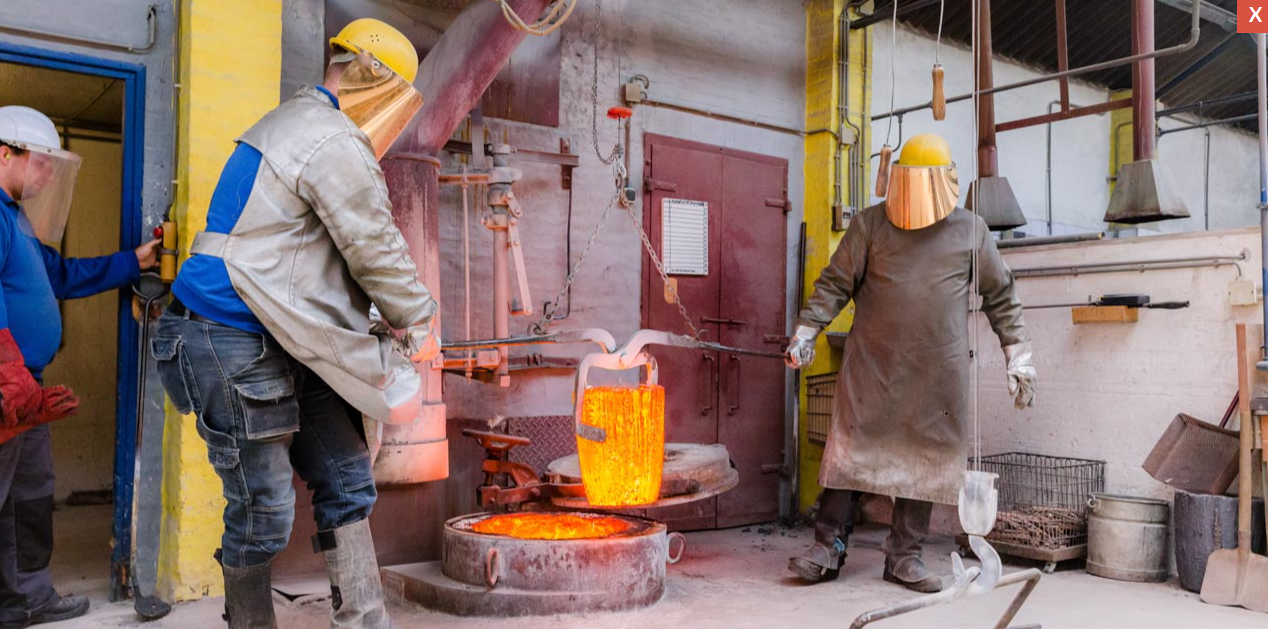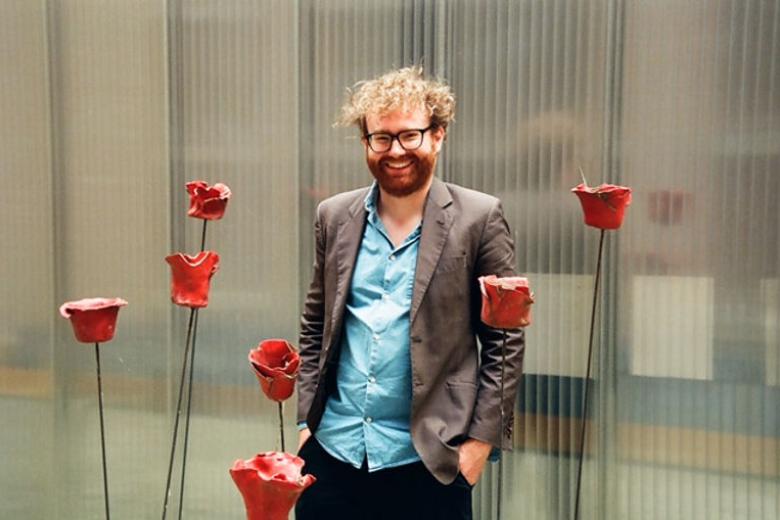Sprechen Sie Deutsch?
Are middle school students sufficiently prepared for a Euroregional labour market? What happens when employees interact with speakers of other languages in the workplace? And why do some perceive this interaction as problematic while others do not? Daan Hovens, Assistant Professor in (Dutch) Language Cultures and Cultural Diversity, researches language use in border regions such as the Euregio Meuse-Rhine.
Language perception in middle schools
“I enjoy highlighting perspectives that are rarely addressed in existing research or policy documents,” says Daan. “Not only is that more democratic and inclusive, but reality is often more complex and interesting than expected. That is what drives me.”
Many policymakers assume that promoting neighbouring languages positively impacts integration in border regions. However, the reality is more complex. “In 2010, the Duitsland Instituut Amsterdam published an interesting research report on students' choices regarding the German language subject. They conducted a large survey among Dutch middle school students, but the response rate among vocational students (VMBO) was too low to include this group in the results. Additionally, I noticed that no middle schools from Limburg participated in the survey.”
Daan decided to conduct his own survey among vocational students at a middle school in Limburg, located less than five kilometres from the Dutch-German border. He also administered the same survey at a nearby school on the German side of the border. “You could walk from one school to the other in less than an hour. Yet, students from both schools hardly engaged with their 'neighbouring country' or 'neighbouring language.' They reported having virtually no contact with people on the other side of the border and could not imagine living, working, or studying there in the future.”
Daan found his findings “sobering but also fascinating.” “The results demonstrated the significant impact of the national border, especially considering how close the schools were to each other. For policymakers aiming to further integrate the border region, there was clearly still much work to be done.”
Multilingualism in the workplace
During his doctoral research, Daan shifted his focus from students to employees. “I noticed that much research and policy initiatives focused on young people who might, in the future, work across the border. In my PhD research, I wanted to examine people who were already crossing the border.”
He outlines a global picture of cross-border workers in the Euroregional society. “The majority of people, let's say the middle class, do not work across the border. Then, there is a group of academics who are somewhat more mobile, for example, those working for Maastricht University or the academic hospital. Finally, there is a group of temporary workers and labour migrants who keep the agricultural, logistics, and industrial sectors running in Limburg. They make up a significant portion of current cross-border commuters, particularly in North Limburg.”
This last group had been largely overlooked in research and policy. To gain a better understanding of the Euroregional labour market, Daan decided to immerse himself in a company with many cross-border workers. “I eventually ended up at a large metal foundry in Limburg. The management of this company was always very open with me. They were struggling with the issue of 'multilingualism' and were curious about what I would observe in the workplace. That’s how my ethnographic fieldwork began.”
The Dutch-German ‘language border’ at the foundry was of a completely different nature than at the middle school. “There were many first-generation migrants, including refugees who had recently arrived in the Netherlands from Syria. They could often speak some Dutch but hardly any German or English. Meanwhile, their colleagues often spoke only German. They frequently improvised using gestures and ‘receptive multilingualism’ – meaning one person would speak Dutch while the other responded in German.”

The politics of language
Daan grapples with the question of whether language diversity in the workplace was truly a ‘problem’. “Opinions on this issue were sharply divided at the foundry. Some employees saw this diversity as a major obstacle to efficient, safe, and pleasant work, while others thought the focus on language differences was exaggerated. I believe both perspectives have merit; it largely depends on how one views multilingualism.”
It is also crucial to consider the origins of language diversity at the foundry. “Until the economic crisis of 2008-2009, the workforce at the foundry was not very diverse. During the crisis, the company faced difficulties and laid off many permanent employees. The management then became cautious about hiring new permanent staff and started relying on temporary workers during peak periods. These were often young labour migrants from Central and Eastern Europe, as well as the aforementioned Syrian refugees, increasing language diversity.”
It is difficult to separate employees’ attitudes toward language diversity from this political-economic context. “The economic crisis was traumatic, and many ‘local’ employees did not believe that the current language diversity was a logical, necessary outcome of circumstances. They were not eager for a researcher to come and observe how communication could be improved. For them, language diversity was a problem that should never have arisen in the first place.”
Temporary workers from Central and Eastern Europe often viewed language diversity as much less of a problem. “Of course, one might question how open and honest they were with me. If I concluded that language diversity was a major issue, it could cost them their jobs. However, I had the impression that they were sincere. Many had already worked in various places before coming to the foundry – such as a mine in the Czech Republic, a car factory in Germany, or a farm in the Netherlands. They knew what it was like to be new somewhere and to have to improvise. Language barriers were not their main concern.”
The future of neighbouring languages
Daan’s research at the foundry also led to new reflections on his earlier work with middle school students. “Many ‘local’ Limburgish employees at the foundry were older, but there were also younger workers. While the older employees preferred to use German as a ‘foreign’ language, the younger ones favoured English. However, when I listened to recordings of moments when both groups spoke German or English, I did not notice that one group spoke significantly ‘better’ German or English than the other. I have the impression that perception and self-confidence play a larger role than actual proficiency.”
Daan is not overly concerned about the future of neighbouring language knowledge in the Euregio Meuse-Rhine. “Integrating the Euregio is not a goal in itself, just as learning ‘neighbouring languages’ is not a goal in itself. Ultimately, it is about what kind of economy we want to have and what kind of society we want to be. From there, we can determine the most appropriate language policy. Given the ongoing discussions about the future of the agricultural sector, logistics, industry, and even higher education, many political conversations still need to take place. I hope my research can contribute to making these discussions broader and more nuanced, with greater understanding of different perspectives.”
Text by: Eva Durlinger
Pictures by: Claire Gilissen and Katharina Sogeler
Also read
-
Kris Goffin featured in documentary on unconscious biases
Are unconscious biases steering our decisions more than we realize?

-
FASoS researchers Joris Boonen and Thomas Frissen receive NRO grant
€200,000 for the project ‘Does interdisciplinary education live up to its promises: an evaluation of the added value of interdisciplinary bachelor programmes at Maastricht’s university and university of applied sciences’.

-
Disinformation and democracy: Rethinking truth in a digital age
Disinformation is not a new phenomenon. The assumption that democracy functions smoothly as long as we have facts is inaccurate. Instead, we must recognise that democracy is not governed by an objective 'truth' but by competing worldviews.
